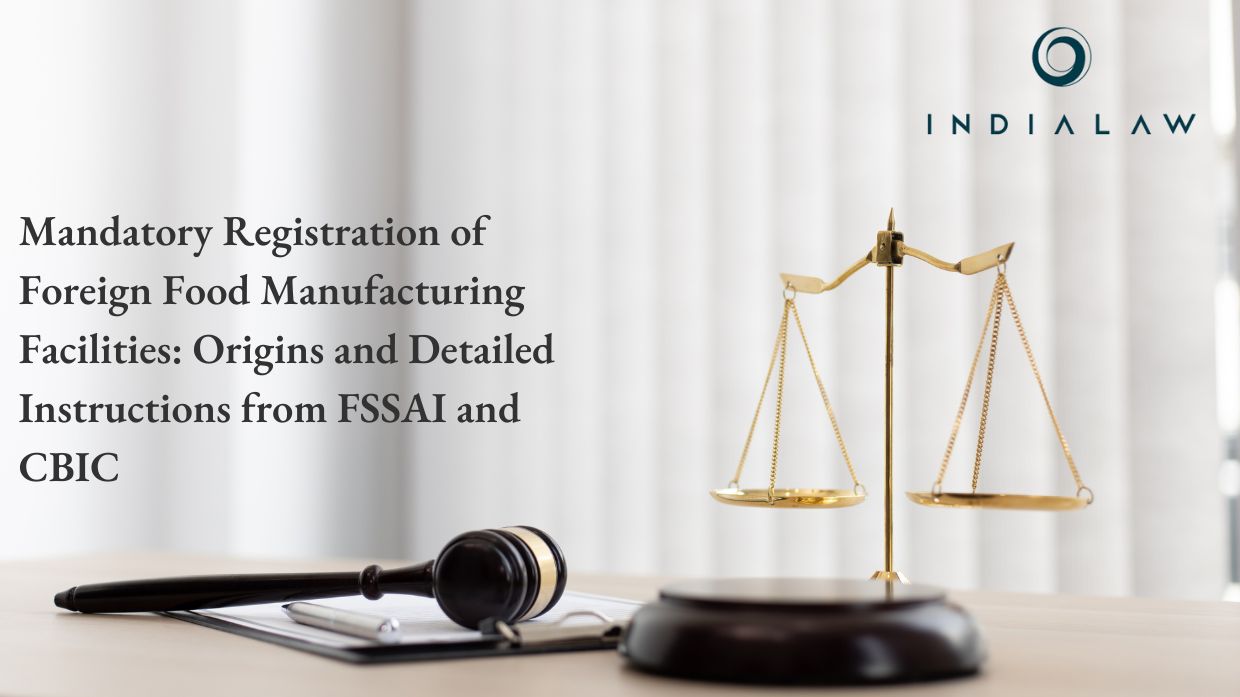Mandatory Registration of Foreign Food Manufacturing Facilities: Origins and Detailed Instructions from FSSAI and CBIC

The Ministry of Finance, in collaboration with the Food Safety and Standards Authority of India (FSSAI), has laid out comprehensive guidelines to implement the mandatory registration of Foreign Food Manufacturing Facilities (FFMF) under the Food Safety and Standards (Import) First Amendment Regulations, 2021. These measures aim to bolster the safety and quality of imported food products, with enforcement effective from 1st September 2024.
This directive, outlined in Instruction No. 29/2024-Customs issued by the Central Board of Indirect Taxes and Customs (CBIC) on 14th November 2024, is rooted in previous circulars and orders issued by FSSAI, emphasizing a robust regulatory framework for importing food items into India.
Table of Contents
Genesis of the Registration Mandate
The foundation for these requirements stems from the FSSAI orders dated 10th October 2022, 4th April 2024, and 30th August 2024, which underscored the necessity for FFMFs to register their facilities. The regulations specifically address five critical food categories:
- Milk and Milk Products
- Meat and Meat Products (including Poultry, Fish, and derivatives)
- Egg Powder
- Infant Food
- Nutraceuticals
FSSAI initially proposed mandatory registration by 1st February 2023, but to accommodate industry requests and ensure smooth implementation, the enforcement deadline was extended to 1st September 2024. During this transition period, stakeholders were advised to proactively register their facilities to avoid trade disruptions.
Implementation Mechanism
Role of the ReFoM Portal
To streamline the registration process, FSSAI developed the ReFoM (Registration of Foreign Food Manufacturing Facilities) portal, accessible at ReFoM Portal. The portal serves as a centralized repository where:
- Competent Authorities from exporting countries submit detailed information about FFMFs intending to export regulated food products to India.
- After FSSAI reviews and approves the data, a Unique Registration Number (URN) is generated for each facility.
The portal is continuously updated based on submissions, ensuring up-to-date information for Indian authorities to verify during import clearance.
Enforcement by Customs
Verification at Import Clearance
Beginning 1st September 2024, the import of food items from the specified categories will only be permitted from registered FFMFs. Indian customs officials are tasked with verifying the registration status of these facilities through the Food Import Clearance System (FICS). The ReFoM portal provides a user-friendly interface to check facility status by navigating through:
Home Page > ReFoM > Click Here to View > Country > Status of FFMF.
Sensitization of Officers
To ensure compliance, customs and FSSAI officers at various checkpoints have been directed to familiarize themselves with the guidelines. These instructions are part of the broader efforts by CBIC to ensure seamless enforcement and uphold public health standards.
Ongoing Updates: Registration will now be a continuous process, with the ReFoM portal being updated regularly as FSSAI receives new information from exporting countries.
Coordination Across Agencies
The Ministry of Finance, through CBIC, and FSSAI, have worked in close coordination to implement these regulations. These efforts aim to foster greater awareness and ensure alignment across all stakeholders involved in food import and safety management.
Conclusion
The mandatory registration of Foreign Food Manufacturing Facilities is a pivotal step in strengthening India’s food safety framework. By ensuring that imported food products meet stringent safety standards, the government aims to protect public health while facilitating transparent and efficient trade processes. Stakeholders, including exporters, importers, and customs officials, are urged to comply with these measures proactively to avoid trade disruptions and support a seamless transition.
With the coordinated efforts of FSSAI and CBIC, India is poised to set a benchmark in food safety and import regulation, reinforcing trust in its global trade ecosystem.
For further details write to contact@indialaw.in
By entering the email address you agree to our Privacy Policy.



